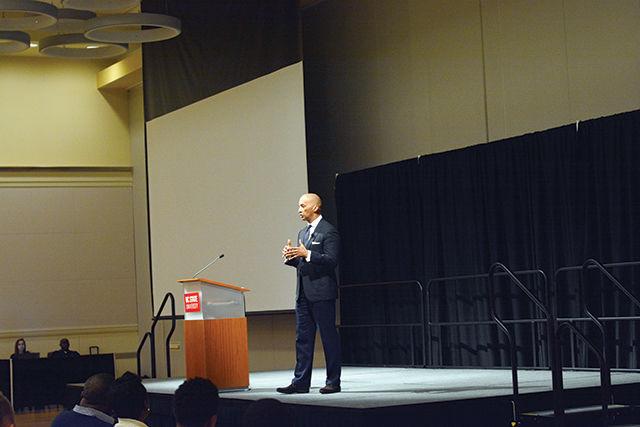Tune in to ABC’s “Nightline,” a late-night television news program, and you will see co-anchor Byron Pitts reporting in-depth on the day’s news stories.
Rewind to 1972 in Baltimore, Maryland, the year Pitts was told he was illiterate and also struggled with a stuttering problem. He graduated 435th in his class, a class of 440 students. Only weeks after starting his freshman year at Ohio Wesleyan College, he was placed on academic probation.
Through his academic struggles, Pitts made it a goal when he was 18 to work for “60 Minutes” by the age of 45.
Pitts spoke at an invite-only event Monday to about 40 students from the African-American Cultural Center, NC State Student Media and University Scholars about his experience entering the journalism world and shared some wisdom about what he has learned in his 32 years in the field.
He credited much of his success to his work ethic — he never passed up a chance for an assignment.
“I only fear the person that can work harder than me,” he said.
Finding a job that would put him in the direction of working for “60 Minutes,” and one that would hire him despite his low GPA proved to be difficult after graduating.
“I put out thousands of resumes, cover letters and applications. The responses were no, hell no and you must be crazy.”
He finally got hired at the Carolinian, a black newspaper in Raleigh, making about $8,000 a year. Then, he worked at Shaw University as the sports information director.
His first TV job was in Greenville, North Carolina, working for WNBC-TV, making $8,600 a year. When his mother learned about his salary, she said, “Boy, are you crazy? Your tuition at Ohio was how much? And you going to take a job making less than that?”
The two didn’t speak for nearly a month. However, Pitts said he didn’t regret the decision because he said it kept him working toward his goal of “60 Minutes.” His salary nearly doubled when he accepted a job in Virginia at a local TV station. He bounced around to Florida, Massachusetts and Georgia dabbling in different journalism jobs before moving to Washington, D.C. as a reporter for CBS.
On top of his work ethic, Pitts said a lot of prayer and faith played a role in where he is today. His mother wore a necklace that had a cross and a mustard seed encased in a clear plastic container, which he now wears.
“It was her daily reminder that if you have faith the size of a mustard seed, you can make a mountain move from here to there and nothing will be impossible,” he said. “It was with my mom’s mountain-moving faith, her 10th-grade education, that she got me the help I needed.”
In college, Pitts said he was reading on a second grade reading level, making his experience very difficult. His roommate also teased him for his limited vocabulary.
As motivation, though, he wore the shirt he wore to cut the grass on the interstate to his exams.
“It was my reminder that if I didn’t finish college, I would be wearing this orange shirt the rest of my life. No disrespect to the people who did it, it’s an honorable job,” Pitts said.
Despite overcoming a stuttering problem, academic probation and illiteracy, Pitts survived as a successful journalist. He went on to say that now is a wonderful time to be a journalist, in particular a female journalist.
“Some of the best journalism that came out of Afghanistan and Iraq was from women because in that part of the world, as well as here at home, men may pretend to be in charge, but it’s really the mama that’s in charge,” Pitts said. “The same thing is true in the Middle East. Because they are women, they are invited into the homes of Syrian families to report on the human conditions there.”
He also commented on the current state of journalism.
“Yes, newspapers may be dying off. Yes TV is where it’s at, and who knows what’s going to happen with social media. But I’ve always said as long as there’s the United States of America, part of our great nation is freedom of the press. You still need a generation of people that have the courage to make convictions and tell important stories.”
However, Pitts’ experience in the journalism world was not always smooth sailing. Twice he fell victim to racism in television broadcasting.
Pitts’ boss put his name to the corporate office to become a national anchor, but the corporate president said, “As long as I’m president of this company, a n—– will never anchor the news.”
His second encounter with racism was when he made it to the CBS network and was working for the morning news. He went to see another boss in D.C., who blew him off with phone calls, but Pitts was finally called into his office.
“I don’t know why you came up to D.C. today,” he said. “I don’t like you, I don’t like your work, I don’t think you’re right for it, I don’t like your diction, I guess it’s the Southern black thing, but I don’t like it. As long as I’m here you’re not going to anchor this show.”
In both instances though, Pitts turned to prayer as solace.
“Count it all as joy,” Pitts said.








